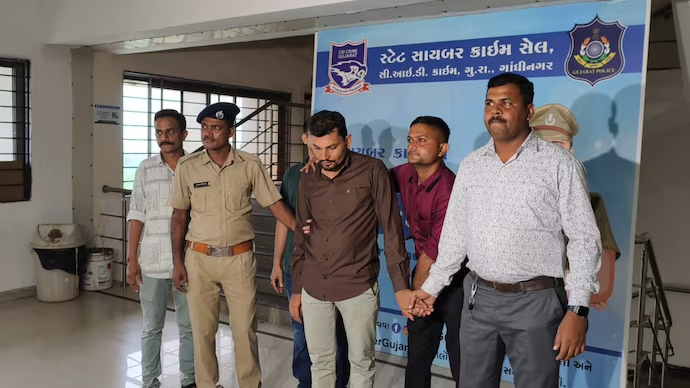
CID Crime cracks Cambodia-India cyber syndicate; 90-day mental torture and financial wipeout exposed
Ahmedabad: In a shocking case that exposes the depths of modern cybercrime, a renowned doctor from Gandhinagar was conned of over ₹19 crore in what is now being dubbed India’s longest-running “digital arrest” scam, spanning three months from March to June 2025.
The accused – part of a sophisticated cyber syndicate operating between Cambodia and India – subjected the victim to continuous psychological intimidation, forcing her to liquidate almost all her financial assets including fixed deposits, gold, property, and shares.
🕵️♀️ How the ‘Digital Arrest’ Began
On March 15, 2025, the doctor received a call from someone identifying herself as Jyoti Vishwanath from the Department of Telecommunications. Within hours, more individuals posing as senior officials – including a police sub-inspector, public prosecutors, and a notary officer – contacted her from various numbers.
The fraudulent team accused her of being involved in a money laundering case, citing violations under the FEMA and PMLA Acts, and even emailed her a forged Enforcement Directorate (ED) letter naming her as an accused.
They warned her of an impending FIR, and claimed all her phones would be shut down unless she cooperated. Terrified and coerced, the doctor was told not to disclose the matter to anyone and to follow orders or face arrest.
🎥 Constant Surveillance and Psychological Torture
For 90 days, the woman was made to believe she was under 24×7 surveillance by “plainclothes officers”. She was instructed to share live locations and make daily video calls to prove her whereabouts.
During her nephew’s wedding in Surat, she secretly called the scammers multiple times a day, showing visuals of the venue to “prove” she hadn’t fled.
The pressure grew unbearable. Under duress, she:
- Broke FDs and sold home gold
- Took loans against bank locker gold
- Sold shares and even her house
By July 26, she had transferred over ₹19 crore to 35 bank accounts, on the pretext of receiving a “Financial Supervisionary Freezing Certificate” — a fake document sent by the fraudsters.
🚨 Scam Busted: CID Registers Case, First Arrest Made
The victim finally broke down and confided in her family, who helped her report the incident to the Gandhinagar Cyber Crime Cell. A formal case was filed, and on July 16, the Gujarat CID Crime Branch registered a case against:
- 5 main accused, and
- 35 account holders linked to the laundered money
The first arrest was made in Surat, where Laljibhai Jayantibhai Baldaniya was held after investigators traced ₹1 crore to his account.
🌐 Cambodia-India Cyber Crime Network Unmasked
Initial findings suggest the scam was coordinated by two interlinked networks:
- An international cyber gang based in Cambodia, and
- A domestic team in India that helped launder the stolen funds.
The gangs obtained prior access to the doctor’s financial history and asset portfolio, which allowed them to create a highly manipulative and believable narrative.
To tackle the case, CID Crime has formed four specialised teams to:
- Trace financial transactions
- Track social media and phone activity
- Investigate suspects on ground
- Monitor cross-border links
Though Cambodian gangs have previously defrauded Indians, this is Gujarat’s first case of such magnitude, with cyber police confirming it is India’s largest digital arrest scam to date.
🧠 Digital Arrest Scams: Growing Threat in India
This case adds to a growing list of “digital arrest” frauds, where scammers impersonate law enforcement and manipulate victims into believing they are under surveillance or facing charges. Victims are psychologically broken down through fear, isolation, and constant pressure — tactics commonly associated with coercive interrogation methods.
Cyber experts warn that professionals and senior citizens are especially vulnerable due to their unfamiliarity with such evolving cyber threats.
🛡️ Public Advisory
Authorities advise:
- Never share personal or financial information over the phone without verification
- Always consult a family member or legal advisor before making any financial move under pressure
- Report suspicious calls to the local Cyber Crime Helpline (1930) or log complaints on cybercrime.gov.in